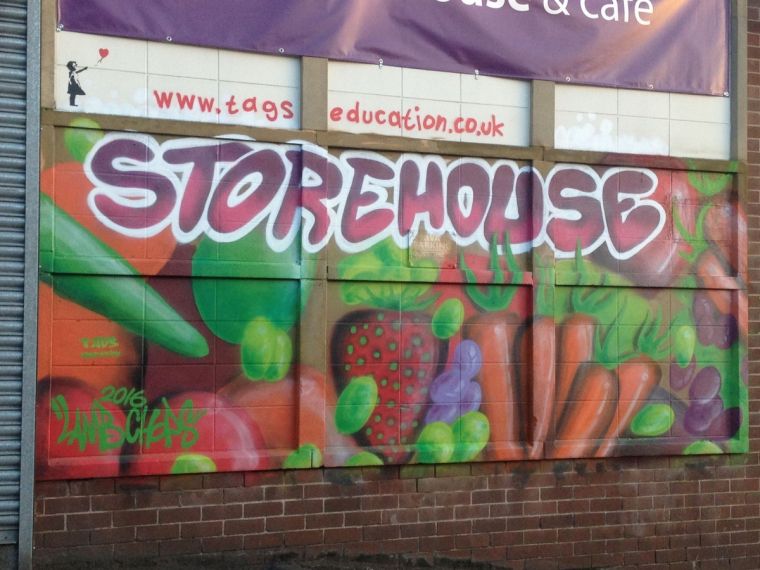God's Storehouse: Feeding The Hungry In One Of Britain's Poorest Cities

The UK sends 11m tonnes of food a year to landfill – we're the most wasteful country in all of Europe – and yet millions of people are also going hungry. It is an injustice that spurs us on to act – but to do what, exactly?
Most of us will have donated to a food bank, given our time (or needed its help), but Juli Thompson went one step further.
She set up a scheme in Yorkshire that, in its first year, has managed to redirect 74 tonnes of food from its path to the tip and into the hands of people in need. That's the equivalent of 150 pallets of food.
The Storehouse, half-a-mile from Bradford city centre, followed from the success of Inn Churches, a project to turn church buildings into temporary homeless shelters to ensure no one in Bradford need sleep on the street in Winter. An army of 850 church volunteers run the service, but Thompson believed more could be done.
"We just wanted to provide practical support to people in need, not replicating any other service, but by being a resource for other organisations and charities. We looked for opportunities to support the community," she says.
"An amazing landlord said we could have these premises rent-free for the first year and we began.
"I didn't know what to call this new place so I prayed and God gave me Malachi 3:10, 'Bring the whole tithe into the storehouse that there may be food in my house... see if I will not throw open the floodgates of heaven and pour out so much blessing there will not be room enough to store it'."
The large premises with several offices included a former staff canteen on the first floor, so a pay-as-you-feel café opened upstairs, while downstairs a food storage warehouse was created. Early into the scheme, Bradford Council's Public Health department was so impressed it donated a £7,000 walk-in fridge.
Another charitable gift has brought a van, enabling efficient transport.
The Storehouse now has agreements to collect food that is past its sell-by date from Morrisons, Marks & Spencer and local St James' market with negotiations in place with other big names. The project is on a vast scale, and is evidently set to grow.
"It costs £75 for supermarkets to throw away a tonne of food so we're helping them as they help us," Thompson explains. "As the verse said, we are able to give from our plenty and we've been so massively blessed."
Each item of food is weighed and packaged for various uses with the intention of it leaving the building as soon as possible. Dry goods are given to 21 local food banks or community groups, supplemented by mobile pay-as-you-feel mini-markets (stacked wheeled crates) bringing much-needed cheap fresh fruit and vegetables to hard-up families in locations across Bradford.
There is even a social enterprise group which arrives one evening a week to make jams and pickles from anything left over.
"It's just morphed, really. If God had shown me a year ago what he had in mind, I would have run in the opposite direction. It's a good thing he doesn't show you everything in one go," Thompson laughs.
A small team of paid staff are funded thanks to charitable trusts, and six regular volunteers ensure the team can react quickly when a food supplier says it has a surplus. This week has been big on potatoes, apparently – vital, but perhaps less fun than the pallets of ice-cream cones that arrived one week in August.
As we talk, the café is a busy mix of people: those needing a hot budget meal; people supporting the venture; staff from the nearby trades centres or workers from the supermarkets who give. Every morning is a real-life game of Ready, Steady Cook with unknown ingredients creatively turned into a delicious hot menu. Payment is discreetly made through small brown envelopes given with each meal. In the room next-door, clothes, bedding and shoes are available for those in need where they can make their selections in private. Dignity is key.
"We began helping homeless people but, more and more, those who we are helping are in-work, not being able to make ends meet. We are seeing a next level of people really struggling with the unpredictability of zero-hour contracts," Thompson says.
"Of course, we can point a finger at the Government but as we do so, there are three fingers pointing at ourselves to do something."











